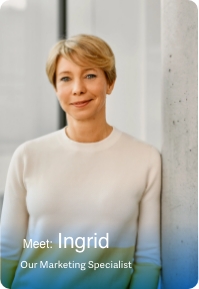At Leadgate Europe we think it’s important that our clients have a clear understanding of what they exactly want to achieve through their Online Marketing. That way we always know what their priorities are and how we can satisfy them best. In this blog article we will explain what exactly an online marketing goal should look like and how you should develop them, to have a clear picture of your next steps when growing your IT business.
1. What is an Online Marketing goal?
An Online Marketing goal is a measurable goal that describes the situation that a company wants to achieve by the end of a certain period by performing Online Marketing activities. An Online Marketing goal is measured by KPIs (Key Performance Indicators) in numbers or percentages. A business goal consists of the mission and vision of your company and an Online Marketing goal should be seen as a translation of these two. From this goal a strategy will follow, that will bring your IT business another step closer to achieving the mission and vision of your organization.
2. Types of Online Marketing goals
As previously mentioned an Online Marketing goal should align with the mission and vision of your business, as it embodies the approach you will need to reach them. Examples of online marketing goals inlcude:
- Increasing sales
- Generating leads
- Attracting new customers
- Improving customer loyalty
- Up-selling or cross-selling
- Improving Brand Awareness
- Increasing customer satisfaction
- Launching a new service or solution
- Rebranding or repositioning
- Increasing website visitors
3. How to set up an Online Marketing goal
To formulate an objective use the SMART principle. The SMART principle is management jargon for the simple and unambiguous setting and monitoring of goals (Wikipedia). The letters of the SMART principle stand for:
- Specific: Describe exactly what you want to do. For example, a 5% monthly increase in the number of Marketing Qualified Leads.
- Measurable: Express your goal in form of a number or percentage so it is measurable. For example: 100 Marketing Qualified Leads in a year.
- Acceptable: There must be sufficient support for the goal, especially if you are setting it up for a whole team. For example, the marketing team must agree with the formulated marketing goal.
- Realistic: The objective must be achievable. For example, if you only achieved 5 Marketing Qualified Leads last year, it is not realistic to state that you plan to achieve 100 next year.
- Time-bound: The goal must be tied to a specific period of time (often a year) so that it can be measured to see if the objective has been achieved.
An example of a SMART goal looks like this : ”By December 31st 2019, the marketing team should have generated 100 MQLs that the sales team can accommodate.”
4. Map out your marketing and sales funnel
Key to setting a realistic online marketing goal is to map out your current marketing data. You can of course plan to generate 100 MQLs per year, but if the data shows that on average you reached only 10 per year, then you should ask yourself whether the objective is realistic. You will have a clear picture of your marketing data linking the marketing and sales funnel. To achieve your online marketing goal it is also essential that you look at which phase of the funnel you achieve the most results. Usually the phases at the top of the marketing funnel have more influence because they last the longest.
In conclusion...
Now that you have all the tools you need to set Online Marketing goals for your IT business, it’s time to start thinking about setting up your online marketing strategy. In this blog article we will tell you more about how to do this using 7 essential elements. Do you have any other questions about setting Online Marketing goals? Then feel free to contact us through the button below or sending an email to info@leadgate.eu.





